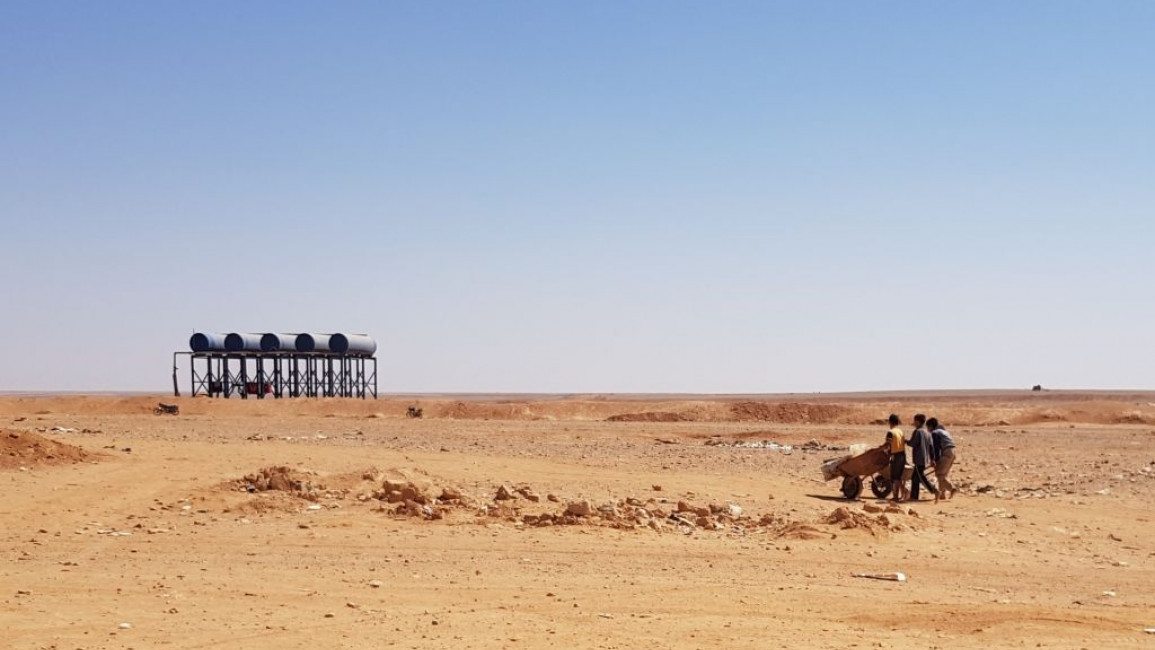Residents of Syria's besieged Rukban refugee camp plead for help as food runs out
Residents of Syria's al-Rukban camp warn they are on the brink of famine after weeks of intensified regime siege.
"The situation is terrible," a mother living in the camp told The New Arab on Sunday. "We are out of baby formula. There is no more flour, which is our main staple. Vegetables have run out, as have all basic items like rice, bulgur and oil."
Located deep in the southern Syrian desert near the border with Jordan, al-Rukban is home to around 10,000 internally displaced people. Many are former rebels and their families, who fled brutal repression by the Syrian regime but got stranded at the border with Jordan, where they hoped to seek refuge.
Al-Rukban has been completely besieged since 2018 by the Syrian regime, which denies humanitarian organisations and UN agencies access to the camp. Some aid used to come from the Jordanian side, until Jordan sealed the border in 2016 after a terror attack killed Jordanian soldiers there.
No UN aid convoy has reached the camp since 2019, forcing residents to rely on a handful of smugglers to bring food and basic goods into the camp at prohibitive prices, bribing their way across checkpoints.
But over the past three months, the Syrian regime has tightened its siege and completely cracked down on smugglers.
"The route taken by smugglers has been completely cut off since two weeks and hunger is starting to show on the faces of our children," Ahmed (a pseudonym), one of the camp residents, told The New Arab. Food shortages have multiplied since March, and the camp has ran out of flour multiple times, according to locals. ِ
"It's not life that's happening there, it's just survival," Simone Jeger, a freelance humanitarian who supports some of the camp residents, told The New Arab.
In addition to food, al-Rukban lacks any health service.
A UNICEF-run clinic on the Jordanian border used to service the camp's medical needs, but it closed in May 2020 - officially due to the Covid-19 pandemic - and never reopened. There is no official reason for this prolonged closure.
Since then, children have died as a result of complications during childbirth and the lack of a medical infrastructure to treat them. Some women in need of C-sections reportedly had to leave the camp and their families to seek care.
"There was some hope when a medical team came and it looked like the [US-led] coalition was going to open a clinic," Jeger added. "Then all of a sudden it stopped. It's like giving people a tiny bit of hope and then withdrawing it."
The United States military, through the International Coalition to Defeat IS, is in control of the area surrounding al-Rukban. It does not give any aid to the local residents, claiming that the responsibility to do so lies with Damascus.
Driven by hunger and medical need, more and more families are leaving the camp and returning to regime areas. The camp population has plummeted to less than 10,000 people, compared to 75,000 at its peak in 2016.
Ahmed told The New Arab that fifteen families left over the past week, and more plan to leave in coming days. The New Arab reached out to the United Nation's Office for the Coordination of Humanitarian Affairs for confirmation and comment but has yet to receive a response.
Returns are coordinated by the United Nations in cooperation with the Syrian Arab Red Crescent, a humanitarian organisation which is known for its proximity with the Syrian regime. The returnees face huge risks: in September, Amnesty International warned that returnees from al-Rukban were specifically targeted by the Syrian regime and documented several cases of torture, arrest and enforced disappearance.
The testimonies shared by al-Rukban's residents cannot be verified independently due to the complete inaccessibility of the camp. No journalist or humanitarian has set foot inside the camp since 2016, but multiple human rights organisations have documented the dire humanitarian conditions in the camp.


![President Pezeshkian has denounced Israel's attacks on Lebanon [Getty]](/sites/default/files/styles/image_684x385/public/2173482924.jpeg?h=a5f2f23a&itok=q3evVtko)



 Follow the Middle East's top stories in English at The New Arab on Google News
Follow the Middle East's top stories in English at The New Arab on Google News


